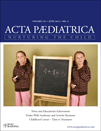Sleep problems in children with cerebral palsy and their relationship with maternal sleep and depression
Abstract
Abstract Aim: To compare sleep problems in children with cerebral palsy to typically developing children. To study the relationship between sleep problems in children with cerebral palsy and maternal sleep quality and depression.
Methods: Fifty-seven children with cerebral palsy aged 4–12 years were identified from a UK disability database. Maternal sleep disturbance and mood were assessed using the Pittsburgh Sleep Quality Index and the Major Depression Inventory. Child sleep problems, assessed with the Children’s Sleep Habits Questionnaire, but not maternal variables, were compared to 102 typically developing children.
Results: Forty children (70%) were recruited with a mean age of 7.8 (SD 2.4). Sleep anxiety, night wakings, parasomnias and sleep-disordered breathing sub-scales indicated significantly more difficulties than in typically developing children. 40% of mothers of children with cerebral palsy had poor sleep quality of whom 44% had depressed mood. Child and maternal sleep disturbance were significantly correlated. Maternal sleep quality predicted 50% of the variance in maternal depression.
Conclusions: Children with cerebral palsy have more sleep problems than typically developing peers. Their mothers also have disturbed sleep that correlates with maternal depression. Childhood sleep problems can be treated and should be identified in routine clinical practice.




